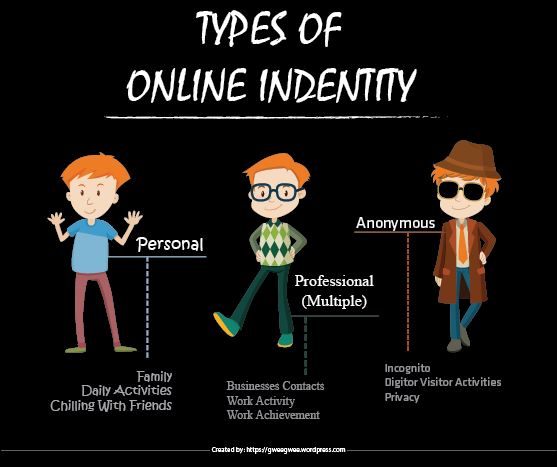
What is Online Identity About?
As mentioned in earlier posts in this blog, the usage of internet has became second nature. Internet has global penetration of more than 42% (Khalid Saleh, 2016) with such an immense amount of population on the net gave life to the term “online identity“.
Whilst having presence online is essential in today’s context as day to day necessity and social needs revolves around the net, we should be aware of the different types of online identity and adopt appropriate persona for the specific online activity.
Types of Identity
Adopted from FutureLearn, I understood the different types of identity and their respective pros and cons. Below are the illustrations of the types of identity.
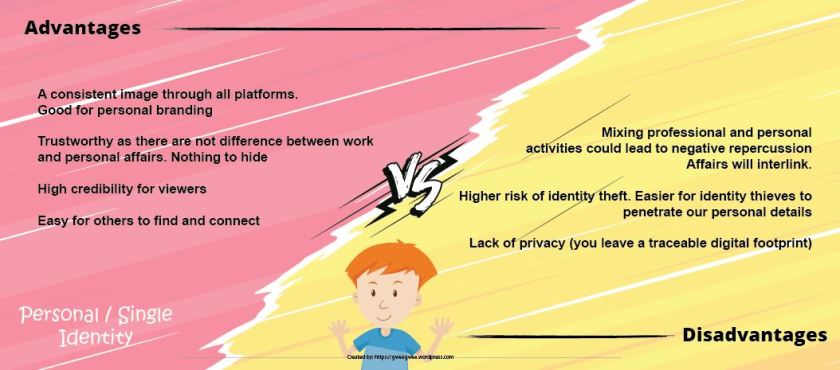
On a personal context, I am a single identity user. One big pulling factor for being a single identity user would be the ease to toggle through different applications with a click of a button. Countless platforms allow for web users to sign up with a click of a button, linking your social media account to the new web you are using.
However, linking your personal social media accounts to countless of website might not be a wise choice. It opens opportunity for identity thieves, provides data to sources that you are unaware of it’s credibility. (Thorin Klosowski, 2013) In the end, is it ease or security that drive your choice?

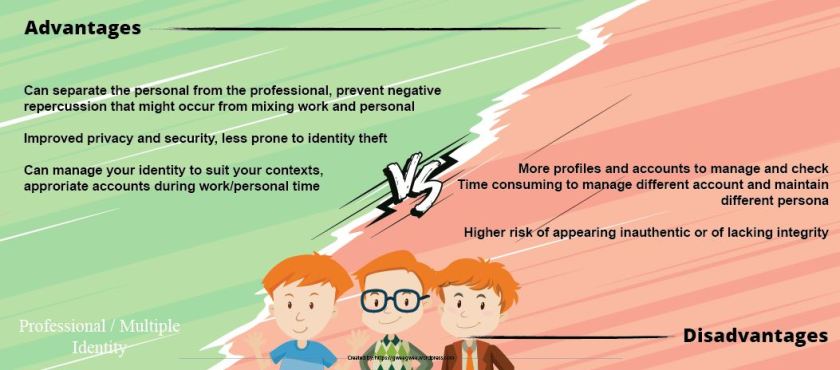
Similar to single identity, multiple identity creates high security for users. Prevents mixing of personal and work affairs.
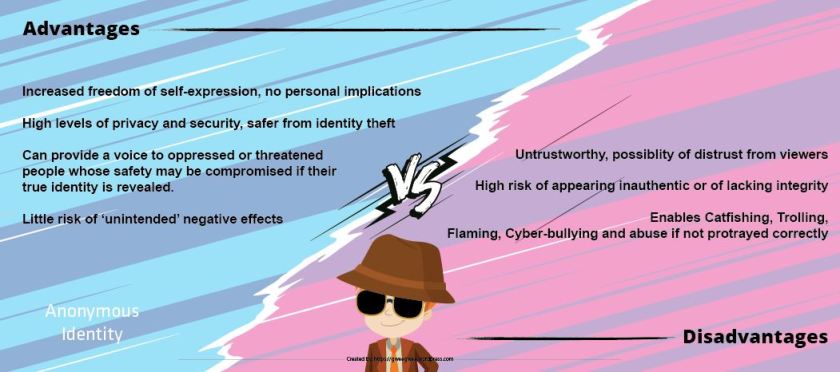
Anonymous Identity would be most suitable when visiting sensitive websites. Government websites, banking, confidential personal information. With anonymity, it provides us with a sense of assurance.
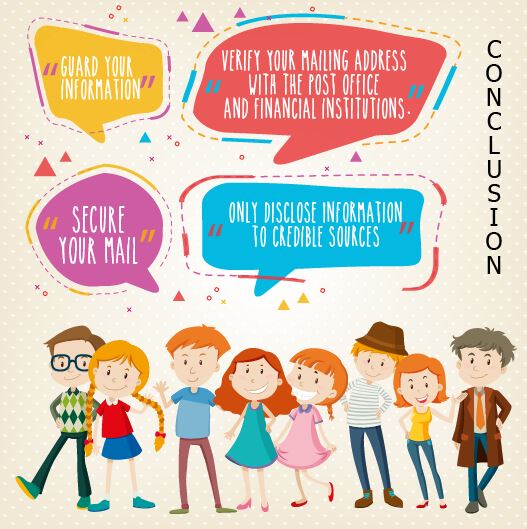
Figure 5
Conclusion
To choose which identity best suit, consider the implications both online and offline. Be digitally literate and proficiency in the know-how of protecting online identity, one could use any type of identity that best suits the type of behavior they have online.
References:
(Aleks Krotoski,2012) – https://www.theguardian.com/technology/2012/apr/19/online-identity-authenticity-anonymity
Online Identity – https://en.wikipedia.org/wiki/Online_identity
(Khalid Saleh,2016) – https://www.invespcro.com/blog/world-population-online/
https://www.futurelearn.com/courses/learning-network-age/3/steps/263025
(Thorin Klosowski,2013) – https://lifehacker.com/5984575/is-there-any-reason-not-to-use-my-social-network-account-to-sign-into-apps
Figure 5 – http://guides.wsj.com/personal-finance/credit/how-to-protect-yourself-from-identity-theft/
WORD COUNT: 314


Hi Gary!
I love your infographics!! Very cute and I’m not expecting that from you!
You mentioned that anonymous identity is great for visiting sensitive websites and you listed government and banking websites. However, I believed that these websites uses a single identity approach where you have to list out your real name, real address and real personal information for verification (Basu, 2017). You are not allowed to hide behind an anonymous identity and be able to access personal sensitive information. For example, in Singapore, we uses a single identity approach called SingPass, where every citizen is required to sign up and fill in with real personal data. This data ws subsequently stored in the nation data vault and banks was able to access the data since May 2017 (TodayOnline, 2017). I would say anonymous identity would be more ideal for forums website such as Reddit, where people would mask their identity to comment on controversial topics.
Personally, do you face any security issues with a single identity log in? Do you think that your privacy was compromised?
(178 words)
Sources:
Basu, M. (2017). Details: Singapore’s new digital identity scheme | GovInsider. GovInsider. Retrieved from https://govinsider.asia/digital-gov/singapore-trials-new-digital-identity-scheme/
New Govt portal allows businesses to tap citizen data to speed up processes. (2017). TODAYonline. Retrieved from http://www.todayonline.com/singapore/myinfo-give-businesses-greater-efficiency-access-hassle-free-digital-services
LikeLike
HI Jocelyn! Thanks for the compliment!
I understand you views with regards to using of single identity for visiting high importance web platforms. However, i feel that the term single identity might not be what is used, that in itself would be a very profound separation from the three very basic identities stated in my post.
In government websites where SingPass are used, i believe it is more of the authentication process use that should consider it is a single identity feature. They felt that with 2FA verification, it would greater increase the security for unintended users from accessing our information. However government webpages would allow you to use facebook, instagram and etc. to prove your credibility or authenticity therefore, in essence the persona you have registered with the government does not interfere with the profiles you show on our social media platforms. But indeed, one could argue if it is multiple, single or anonymous and it would be a comprehensive understand to truly define it.
As for single identity login when your data/information are all linked. I tend to receive unintended promotions and marketing messages, do you have similar experience as well and does it bothers you if you had.
LikeLike